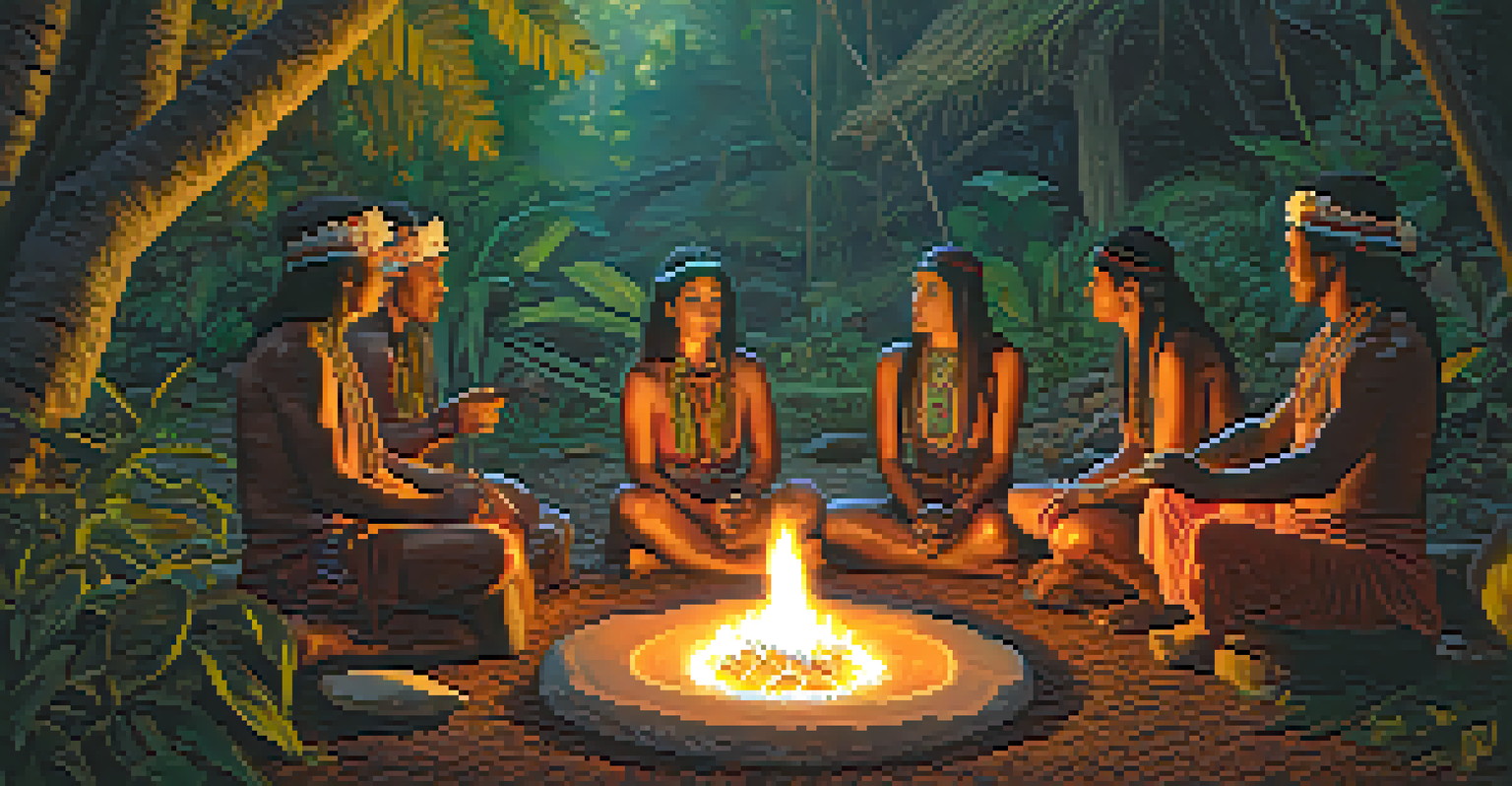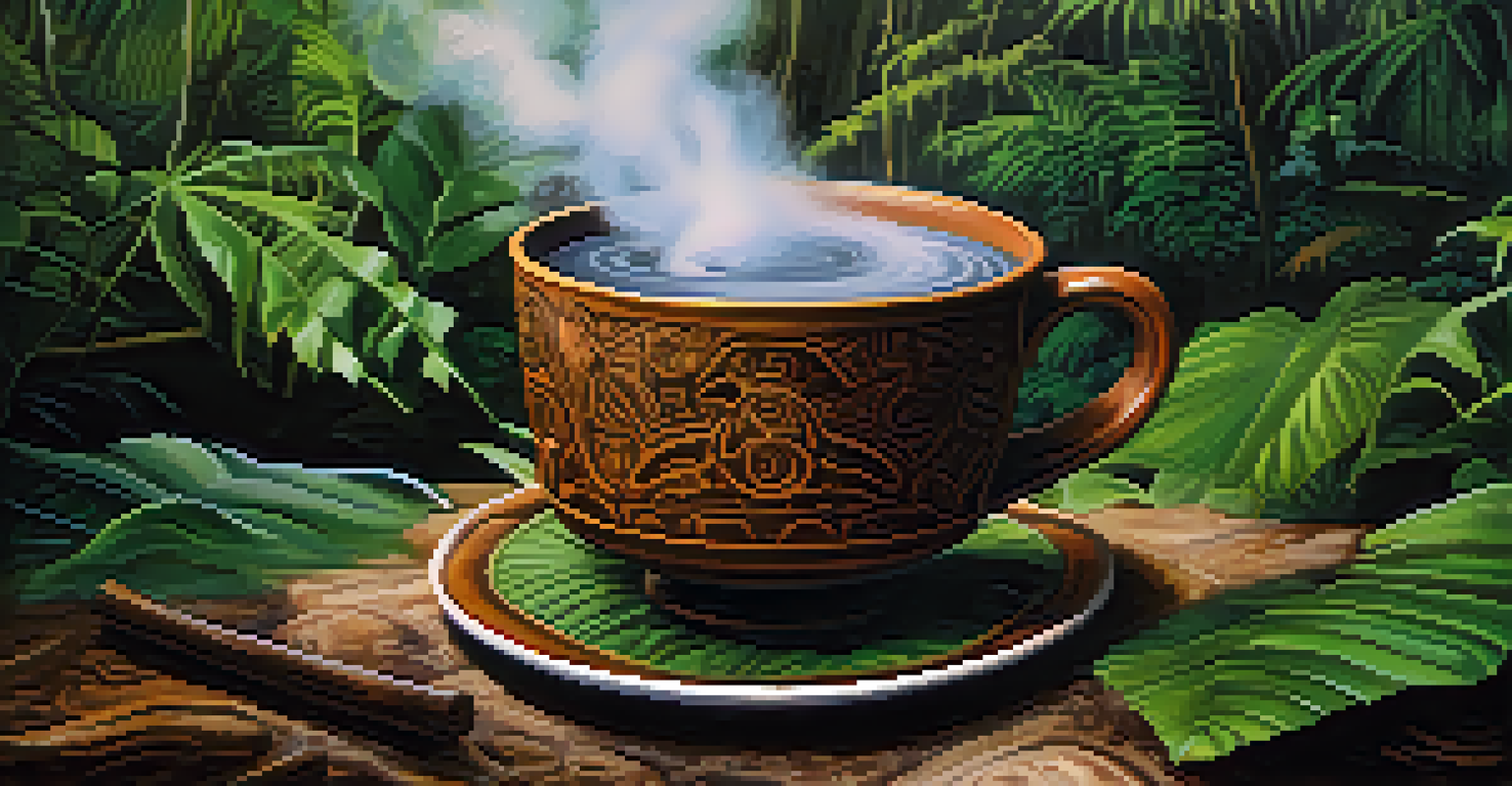Cultural Appropriation in Ayahuasca Practices: An Ethical Dilemma

Understanding Ayahuasca: More Than Just a Trend
Ayahuasca is a traditional Amazonian brew, known for its psychoactive properties, used for centuries by Indigenous cultures for spiritual healing and insight. It combines the Banisteriopsis caapi vine and the Psychotria viridis leaf, creating a potent drink that induces deep introspection. While its popularity has surged in Western wellness circles, it's essential to recognize that this is not merely a trendy psychedelic experience, but steeped in rich cultural significance.
Cultural appropriation is the act of taking or using elements from a culture without understanding or respecting its significance.
For many Indigenous communities, Ayahuasca ceremonies are sacred rituals, integral to their identity and spiritual practices. These ceremonies often involve trained shamans who guide participants through the experience, providing not only the brew but also cultural context and support. As the Western world increasingly embraces Ayahuasca, the risk of commodifying and diluting these traditions grows, leading to ethical concerns about respect and representation.
Understanding Ayahuasca's cultural roots is crucial for anyone interested in participating in these ceremonies. It’s not just about the experience itself but also about honoring the traditions and communities that have safeguarded this knowledge for generations.
Cultural Appropriation: Defining the Concept
Cultural appropriation occurs when elements of one culture are taken and used by another, often without permission or understanding, leading to power imbalances and disrespect. In the context of Ayahuasca, this can manifest when non-Indigenous individuals engage in ceremonies without acknowledging their origins or the struggles of the Indigenous peoples. It raises questions about ownership, authenticity, and respect for the original practitioners.

The line between appreciation and appropriation can often blur. When individuals seek Ayahuasca for personal insight without recognizing its cultural significance, they risk commodifying a sacred practice. This can lead to a superficial understanding that overlooks the deep spiritual and communal aspects embedded within these ceremonies.
Cultural Significance of Ayahuasca
Ayahuasca is a sacred brew with deep cultural roots among Indigenous communities, emphasizing the importance of respecting its traditions.
Recognizing cultural appropriation is vital for fostering mutual respect and understanding between different cultures. It encourages individuals to approach practices like Ayahuasca with humility and a willingness to learn, rather than merely consuming them for personal gain.
The Impact of Ayahuasca Tourism
Ayahuasca tourism has exploded in recent years, with many travelers flocking to South America in search of spiritual awakening. While this influx can provide economic benefits to local communities, it also raises significant ethical questions. Are these communities receiving fair compensation for sharing their sacred traditions, or are they being exploited for profit?
We must learn to respect the wisdom of Indigenous cultures and recognize that their traditions are not commodities to be consumed.
As retreat centers open up, often run by non-Indigenous individuals, the integrity of the traditional practices can be compromised. Some centers may prioritize profit over the well-being of participants, leading to experiences that lack the cultural depth and support that genuine ceremonies provide. This commercialization can dilute the spiritual essence of Ayahuasca, transforming it into a mere transaction.
Moreover, the health and safety of participants can also be at risk in poorly managed retreats. The absence of trained shamans and proper guidance can lead to dangerous experiences, highlighting the need for ethical practices within Ayahuasca tourism.
Ethical Considerations for Participants
For those considering participating in an Ayahuasca ceremony, it’s essential to approach the experience with respect and ethical consideration. Researching the cultural background and the specific traditions associated with Ayahuasca can help individuals understand their role and the significance of the practice. This knowledge fosters a deeper appreciation and a more meaningful experience.
Engaging with Indigenous communities and participating in ceremonies led by their members can also promote ethical tourism. By prioritizing authentic experiences, participants can contribute to the preservation of these cultural practices, ensuring they remain intact for future generations. It’s about building relationships based on respect rather than exploitation.
Risks of Ayahuasca Tourism
The rise of Ayahuasca tourism raises ethical concerns about exploitation and the dilution of cultural practices for profit.
Ultimately, being mindful of one’s impact on the culture and community involved in Ayahuasca practices is crucial. This means listening, learning, and honoring the traditions that have been passed down through generations.
The Role of Shamans in Ayahuasca Ceremonies
Shamans play a vital role in Ayahuasca ceremonies, acting as spiritual guides and custodians of the tradition. Their knowledge is often accumulated through years of training and experience, allowing them to navigate the complexities of the Ayahuasca journey. They provide not just the brew, but also the wisdom and context needed to ensure a safe and meaningful experience.
The presence of a shaman can significantly influence the ceremony’s outcome, as they help participants process their experiences and insights. This guidance is particularly important, given the deep emotional and psychological work that Ayahuasca can provoke. Inappropriately led ceremonies can lead to disorientation and confusion, emphasizing the importance of respecting the role of traditional practitioners.
As Ayahuasca becomes more popular, the risk of untrained individuals assuming the role of shamans increases. This can lead to harmful practices that exploit the sacredness of the tradition, further complicating the ethical landscape surrounding Ayahuasca use.
Navigating the Ethical Dilemma
Navigating the ethical dilemma surrounding Ayahuasca practices requires a balance between personal exploration and cultural respect. It’s about finding ways to engage with Indigenous wisdom while ensuring that the practices remain intact and respected. This often involves critical self-reflection and a willingness to listen to the voices of Indigenous communities.
Engaging in open dialogue with Indigenous practitioners can help bridge the gap between cultures. It allows for a more profound understanding of the implications of Ayahuasca use and the responsibilities that come with it. Listening to those who have been custodians of this knowledge fosters a mutually beneficial relationship.
Role of Shamans in Ceremonies
Shamans are essential guides in Ayahuasca ceremonies, providing the necessary wisdom and support to ensure a safe and meaningful experience.
Ultimately, the goal should be to create a space where both personal growth and cultural integrity can coexist. By prioritizing ethical considerations, participants can contribute to a more respectful and meaningful engagement with Ayahuasca practices.
Conclusion: Embracing Respect and Understanding
As the conversation around cultural appropriation in Ayahuasca practices continues, embracing respect and understanding becomes paramount. By acknowledging the roots of Ayahuasca and the significance it holds for Indigenous communities, participants can engage more meaningfully. This journey is not just about personal insight but also about honoring the traditions that have safeguarded this knowledge.
Encouraging ethical tourism and genuine engagement with Ayahuasca practices can lead to more authentic experiences for all involved. It allows for a richer understanding of the cultural context, fostering a sense of shared humanity. Ultimately, the responsibility lies with each individual to approach these practices with care and reverence.

In a world that increasingly seeks connection and understanding, let us remember that true transformation comes not from appropriation, but from respect and collaboration with those who have walked this path long before us.